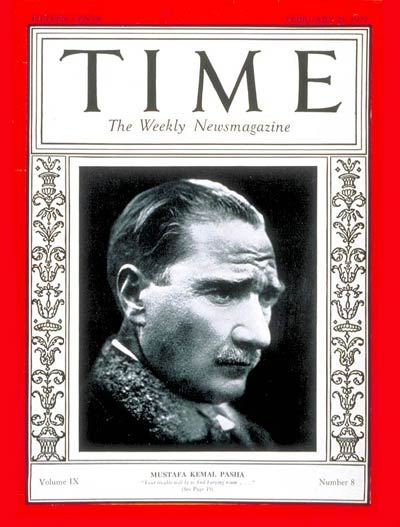This week as we mostly talked about how important for a leader to make adaptation on himself first and then others, I wanted to write about my idol leader in history. If you ever visited my home country Turkey, you have probably noticed lots of statues, portraits, and photographs of Mustafa Kemal Atatürk (1881 – 1938) displaying in random restaurants, banks, post offices and even in cars windows as a decal, who is the founder of the modern Republic of Turkey.
Atatürk was a charismatic leader (he is my first pick and the second one is JFK) and a comprehensive reformer, and task leading leader to his citizens through a drastic and comprehensive program of reform to “westernize” the Republic of Turkey so that it could hold its own among other developed nations. The central belief driving the reform program was that Turkey would have to Westernize in order to modernize and stay compatible woth the rest of the modern western countries. The six main principles that underpin these reforms are referred to as “Kemalism”, and are actually written into Turkey’s constitution: republicanism, nationalism, populism, reformism, etatism (statism), and secularism. Today they are still valued and treasured by most Turkish citizens.
As the ideas behind Schein’s (1980) planned change theory, Ataturk miraculously managed to empower his people not only learning new things but adapt to the new things in such short time. He managed to implement his vision thru planned change stages; unfreezing, changing, and refreezing (OLEAD 410, 2018)
He undertook significant legal reforms which replaced the canonical law that was in place, adopting the Swiss Civil Code, and the Italian Penal Code. The key achievement of these reforms was the complete separation of government and religion. Educational institutions and the army were also separated from politics. The exclusion of religion from the nation’s public life was probably the most shocking of his reforms at the time – religious schools were closed down, religion became a matter of personal conscience, and public education was secularised.
Education was made free, co-educational and secular from primary school through to post-graduate level education, and primary school was made compulsory. A particular emphasis was put on the education of girls and women. Atatürk also did much to further women’s rights, introducing laws that would see women enjoy rights equal to men, give them the right to vote and to be elected to parliament. Other laws drastically reformed marriage (abolishing polygamy) and family relations (notably equal rights for women in divorce, custody, and inheritance). Not even clothing was exempt from his reforms – men were banned from wearing the “fez” hat, a ban which continues to today, and wearing of the headscarf or veils in public buildings was also banned.
Many world leaders acknowledged Ataturk as an exemplary leader and even the CEO of Tesla, Elon Musk visited Ataturk mausoleum last year and he shared one of Ataturk’s quotes on his Twitter account.
Although Ataturk died in 1938, his legacy still continues despite the current Turkish government agenda. And although I was not born during his existence, I am proud to say I grew up with the privileges he has provided for me and many other women in Turkey.
References:
OLEAD 410 Lesson 5 Notes (2018). Penn State World Campus.
Mustafa Kemal Ataturk. (n.d) retrieved on February 6, 2018, from http://www.columbia.edu/~sss31/Turkiye/ata/hayati.html





